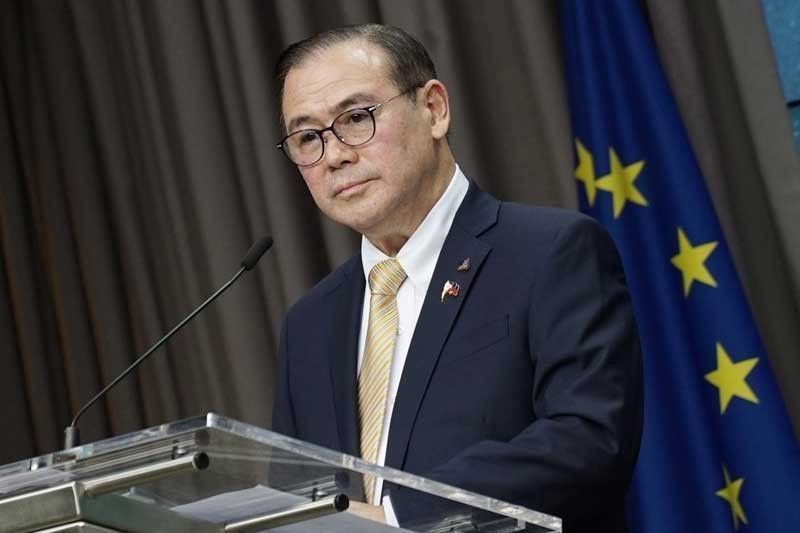DFA official on VFA: Ball in US’ court

MANILA, Philippines — Now that the Philippines has officially notified the United States of the termination of the Visiting Forces Agreement (VFA), it’s up to Washington to make its next move, according to a ranking foreign affairs official.
“The ball is in their court. That’s it. As far as we’re concerned we’ve already served the notice as required by the agreement,” foreign affairs undersecretary Brigido Dulay said in an interview with “The Chiefs” aired Wednesday night on One News-Cignal TV.
He said there are no new VFA-like arrangements with other allies, and officials would take guidance from President Duterte who is the chief architect of foreign policy.
“In so far as our foreign policy on that matter is concerned, we all leave it up to the President. He’s the main man on this one,” he added.
The Philippines relayed to the US embassy on Feb. 11 its notice of termination of the VFA, an agreement considered an enabler of the Mutual Defense Treaty (MDT).
Foreign Affairs Secretary Teodoro Locsin Jr. signed the notice of termination, which he announced on Twitter.
Chief of Mission John Law of the US embassy in Manila received the notice on the same day, the foreign affairs chief said.
The notice to terminate the VFA marked the start of the 180-day period prior to official scrapping of the military agreement, which came into force on May 27, 1999 upon ratification by the Philippine Senate.
But whether a Senate concurrence is needed for the scrapping of the VFA to become official is something still being resolved by senators.
The Senate committee of foreign affairs chaired by Sen. Aquilino Pimentel III failed to resolve the matter at a public hearing yesterday.
Pimentel said the issue was complex, requiring consultation with each of the 15 members of the panel before a committee report could be made.
“We will summarize what will happen and communicate with all the members and get their positions. What came out of the hearing is that this is a complex issue, I did not expect a consensus and there was no consensus,” Pimentel told Senate reporters after the hearing on Senate Resolution No. 305-Senate Concurrence in Treaty Withdrawal/Termination.
“When you read the Constitution, the Senate concurrence to make a treaty valid is there, but to terminate a treaty is not there,” said Pimentel. “The question is how come it is not there in the Constitution.”
He said he was wondering why the drafters of the Constitution took the time to write down a paragraph on validity and effectivity of the Senate concurrence, without adding a few more sentences to make it clear that abrogation of a treaty needs Senate concurrence.
He also clarified that the sense of the Senate would no longer affect the VFA after its abrogation by Duterte.
“Wala na (No more). The critical action has been taken by the President, the DFA informing the State Department of the US (about the abrogation). This (Senate discussion) is for a general rule,” he said.
Other treaties in danger
At the hearing, Senate Minority Leader Franklin Drilon stressed that nothing will prevent President Duterte from ordering a withdrawal from the United Nations Convention on the Law of the Sea (UNCLOS) if Senate concurrence is not needed in officially terminating the VFA. UNCLOS sets the country’s 200-mile exclusive economic zone (EEZ).
He said Duterte did not only abrogate the 1999 VFA, but previously terminated the Philippines’ adherence to the Rome Statute, which places the country under the coverage of the International Criminal Court (ICC).
“We (Senate) concurred into the ratification of the UNCLOS by virtue of Resolution No. 121. The UNCLOS is the very basis of our entitlements to a 200 nautical mile EEZ in the West Philippines. Our baseline and other laws reflect this and other watermarks,” Drilon said.
“What if the executive department unilaterally decides to terminate the UNCLOS, will the Senate be left out from the conversation too?”
“What about our commitments under the UN like Climate Change, Protection for Women and Children, World Trade Organization commitments? We note these treaties have already been ‘deeply internalized’ in our laws, reflected in our customs and tariff laws, family laws, environmental regulation, etc.,” he said.
“The Congress, being the primary policy-making branch of the government, must have a say in the termination, because it involves policy issues,” he said.
The Philippines has invoked the UNCLOS filing a case in China before the Permanent Court of Arbitration (PCA) in The Hague. China is accused of violating the UNCLOS by building militarized artificial islands in the West Philippine Sea in insisting on its “nine-dash line” claim over the entire South China Sea.
But Foreign Affairs Assistant Secretary Igor Bailen told the committee that while Senate concurrence is needed to ratify any treaty, abrogating the same is solely the president’s decision.
“Under your theory, the President can unilaterally withdraw from the treaty on the Law of the Sea?” Drilon asked the official. “Theoretically, yes,” Bailen said.
Drilon said crucial decisions such a terminating an agreement cannot be “left to one man, no matter how brilliant he is.”
Bailen disclosed that shortly before Duterte gave his order, Locsin, and Philippine Ambassador to the US Jose Manuel Romualdez advised him on the implications of such a move.
“But the President had already made up his mind and it’s a decision, of course, that we’re bound to pursue,” the official said.
Gordon lamented the apparent rashness of Duterte in terminating the VFA last Feb. 11. Article 9 of the 20-year old military pact states the abrogation takes effect 180 days after the receipt of the formal notice of termination by either party.
He said the cancellation of the US visa of Sen. Ronald Dela Rosa, and the criticisms of some US senators on detention of Sen. Leila de Lima should not be the basis for the abrogation of the VFA.
“Yes, we should have a national pride and integrity, but to say I’m abrogating it because my man has been denied a visa? For me, any statements made by some US senators not formally approved is fair game,” Gordon said.
Meanwhile, Dela Rosa yesterday said he felt regret that the cancellation of his visa has led to strained relations between the US and the Philippines. He stressed he harbors no resentment toward the US.
“What’s left inside my heart are regrets na lang sa nawala na mahabang
pinagsamahan namin sa trabaho (our long time friendship has come to naught),” he said on the sidelines of the 29th founding anniversary of the Philippine National Police Maritime Group at Camp Crame in Quezon City.
Dela Rosa was particularly referring to the partnership of the PNP and its US counterparts.
He expressed belief US law enforcement officials fully support him and his crackdown on illegal drugs, when he was PNP chief
“My US counterparts, particularly the law enforcement sector, love me because they knew what we had gone through,” he said.
Dela Rosa insists he remains a friend of the US despite his visa’s cancellation, adding his office is always open to Americans. “I hope your embassy is also open for me,” he said.- Paolo Romero, Cecille Suerte-Felipe and Emmanuel Tupas
- Latest
- Trending
































